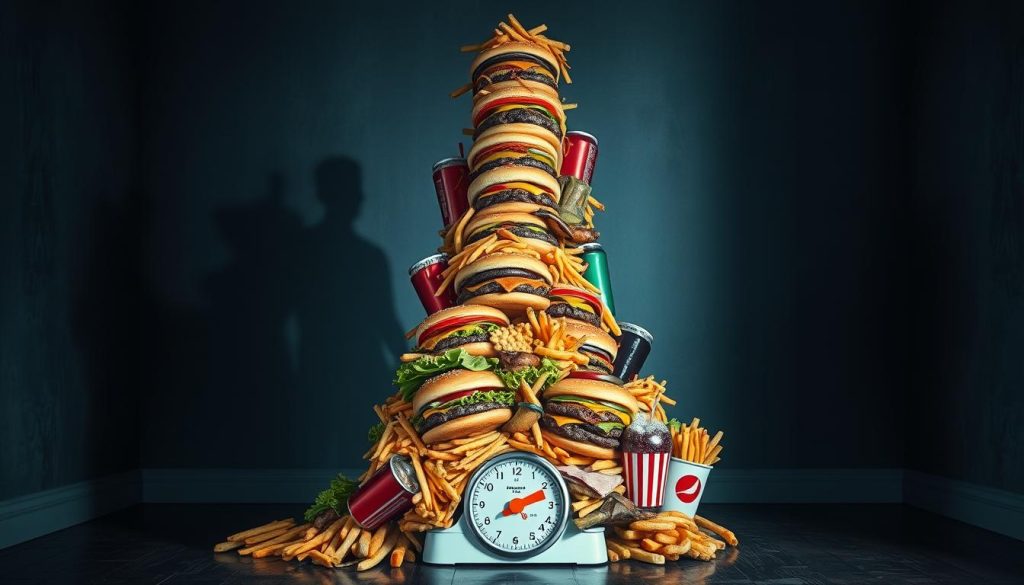In today’s fast world, it’s easy to grab unhealthy food. This includes processed snacks and rich fast-food meals. But, have you thought about how these choices affect your health and happiness? Let’s look into the big problems unhealthy food causes and how to live healthier.
What dangers hide in your favorite junk foods? Are the quick joys worth the long-term health risks? Let’s find out how your food choices affect your body and mind.

Key Takeaways
- Understand the various types of unhealthy foods and their prevalence in modern society.
- Discover the alarming health consequences of consuming processed, high-calorie, and nutrient-deficient foods.
- Explore the link between unhealthy food choices and issues like obesity, heart disease, and psychological impacts.
- Learn effective strategies for transitioning to a healthier lifestyle and making informed decisions about your diet.
- Gain insights into the importance of overall well-being and the role that nutrition plays in achieving it.
Introduction to Unhealthy Foods
In today’s fast world, unhealthy food choices are a big worry. We see a lot of processed junk and high-calorie fast food. These foods often don’t give us the nutrients we need.
Knowing what unhealthy food is and how common bad eating habits are is key. It’s the first step to tackling this big issue.
What Constitutes Unhealthy Food?
Unhealthy foods have a lot of unhealthy fats, sugars, and refined carbs. They include processed foods, fast food, sugary drinks, and other high-calorie, nutrient-poor foods. These foods give too many calories but not the good stuff like vitamins, minerals, and fiber.
Prevalence of Unhealthy Eating Habits
Research shows many people eat unhealthy foods a lot. They eat processed food, junk food, and high-calorie diets often. This is because these foods are easy and cheap to get, and companies market them a lot.
It’s important to tackle this issue to better our health and wellness.
“The foods we eat can have a profound impact on our health, both in the short and long term. Understanding the dangers of unhealthy choices is the first step towards making more informed decisions.”

The Dangers of Processed and Fast Foods
In today’s fast world, many eat a lot of processed and fast foods. These foods can harm our health and well-being. They often have too much sodium, saturated fats, and artificial additives.
High Levels of Sodium and Saturated Fats
Processed and fast foods have too much sodium. This can lead to high blood pressure and heart disease. They also have a lot of saturated fats, which can increase cholesterol and heart problems.
Eating these foods regularly can harm our health and wellness.
Artificial Additives and Preservatives
Many of these foods have artificial additives and preservatives. These can mess with our body’s natural functions. They can cause hormonal imbalances and stomach problems.
It’s important to watch what we eat. We should aim for a healthier lifestyle. Cutting down on processed and fast foods can greatly improve our health and wellness.

“The more processed a food is, the more likely it is to contain unhealthy additives and less of the beneficial nutrients our bodies need.”
Unhealthy Food and Obesity
The rise of unhealthy food options has greatly affected the global obesity epidemic. Studies show a direct link between these foods and obesity. Obesity is a condition with too much body fat, leading to serious health issues.
Unhealthy food is high in calories, fat, and sugar but lacks essential nutrients. This imbalance can cause weight gain. Our bodies struggle to process these excess calories.
“Obesity is a complex health issue that is influenced by a variety of factors, including diet, physical activity, genetics, and environmental factors. However, the increasing availability and consumption of unhealthy, high-calorie foods is undoubtedly a significant contributor to the obesity crisis.”
Some unhealthy foods, like those high in sugar and fat, are addictive. This can lead to overeating and more weight gain. Breaking free from these habits is hard, making it tough to stop the cycle of obesity and poor nutrition.
To fight obesity, we need to promote balanced diets and healthy lifestyles. This means eating less processed and fast food. We should eat more whole, nutrient-rich foods and stay active.

By changing our eating habits and staying active, we can lower our risk of obesity. This improves our health and well-being.
The Link Between Sugary Drinks and Health Issues
Sugary drinks, like soda and fruit juices, are common in many diets. But, their impact on our health is significant. It’s important to understand how these drinks can harm us.
Increased Risk of Diabetes
Sugary drinks may raise the risk of diabetes. They contain high amounts of added sugars. This can cause blood sugar levels to spike, leading to insulin resistance and type 2 diabetes over time.
Drinking sugary beverages often can increase the chance of getting this chronic disease.
Tooth Decay and Dental Problems
Sugary drinks also harm our teeth. Their sugar content can cause plaque, leading to tooth decay and dental problems. Many of these drinks are acidic, which can wear down tooth enamel.
This makes teeth more likely to get cavities and other dental issues.
To stay healthy, it’s wise to limit sugary drinks. Choose water, unsweetened tea, or infused water instead.

“Reducing the consumption of sugary drinks is a key step in promoting overall health and wellness.”
Unhealthy Food and Heart Disease
Research shows a strong link between unhealthy foods and heart disease. Trans fats, a bad type of fat, harm heart health.
Impact of Trans Fats on Cardiovascular Health
Trans fats are in many processed and fried foods. They can increase “bad” LDL cholesterol and lower “good” HDL cholesterol. This imbalance raises the risk of heart disease, stroke, and other cardiovascular issues.
Trans fats also cause inflammation in the body. This inflammation is a major factor in atherosclerosis, or plaque buildup in arteries. This can block blood flow, leading to heart attacks and other cardiovascular emergencies.
“Eliminating trans fats from the food supply could prevent tens of thousands of heart attacks and related deaths each year.”- Centers for Disease Control and Prevention
With strong evidence against trans fats and poor cardiovascular health, cutting down on these fats is crucial. It’s key for keeping your health and wellness in check.

Nutrient Deficiencies from an Unhealthy Diet
Eating too much processed food, junk food, and fast food can cause a big problem: nutrient deficiency. These foods often don’t have the vitamins, minerals, and nutrients our bodies need. This can harm our health and well-being.
One major issue with an unhealthy diet is the nutrient deficiency it can cause. Eating processed food, junk food, and fast food regularly can fill us up with calories but leave out the important nutrition. This can lead to weak immune systems and a higher risk of chronic diseases.

The lack of essential vitamins and minerals in an unhealthy diet can cause many health problems. These include:
- Fatigue and lack of energy
- Weakened immune system and increased susceptibility to illness
- Impaired cognitive function and mood disturbances
- Bone loss and increased risk of osteoporosis
- Cardiovascular issues and an elevated risk of heart disease
To stay healthy and well, we need a balanced diet full of nutrition. Cutting down on processed food, junk food, and fast food and eating more whole, nutrient-rich foods is key. This way, our bodies get the vitamins, minerals, and nutrients they need to be at their best.
The Psychological Impact of Unhealthy Food
What we eat affects our mind and emotions deeply. Foods high in unhealthy fats, sugars, and refined carbs can cause mood swings and emotional ups and downs. It’s key to grasp this to keep our health and wellness in check.
Mood Swings and Emotional Imbalances
Eating unhealthy foods can mess with our mood and emotional balance. Foods high in sugar and refined carbs can make blood sugar levels jump and drop, leading to feelings of anger, anxiety, and sadness. Experts say these foods can mess with brain chemicals, causing emotional issues.
Addictive Properties of Certain Foods
- Some foods, like those with sugar and unhealthy fats, can be addictive like drugs or alcohol.
- The brain’s reward system gets hooked on these foods, making us want more, even when we don’t need it.
- This addiction makes it hard to stop eating unhealthy foods, harming our mental and physical health.
“The more you eat, the more you want – that’s the hallmark of addictive behavior.” – Dr. Kelly Brownell, Director of the Rudd Center for Food Policy and Obesity
It’s vital to tackle the psychological effects of unhealthy eating. Knowing how diet affects mental health helps us make better food choices. This way, we can foster a healthier relationship with food.

Strategies for Adopting a Healthier Lifestyle
Starting a healthier lifestyle is a big step. It begins with choosing the right foods. By planning meals, preparing them, and eating mindfully, we can control our diet and health.
Meal Planning and Preparation
Meal planning is key to a healthy life. Planning meals helps you pick better foods and avoid bad ones. With a plan, you can prepare healthy meals ahead of time.
- Include whole foods like fruits, proteins, and grains in your plans.
- Try new healthy recipes to keep meals exciting.
- Prepare parts of meals early to make dinner easy.
Mindful Eating and Portion Control
Mindful eating is crucial for a healthy lifestyle. Eating slowly helps you understand when you’re full. This leads to better portions and a healthier food relationship.
- Use smaller plates and listen to your body for portion control.
- Enjoy each bite, focusing on taste and texture.
- Stay away from screens during meals to stay focused.
Adding these healthy lifestyle habits to your day can improve your nutrition, weight management, and well-being.

Unhealthy Food: Its Impact on Overall Well-being
Unhealthy food choices affect more than just our bodies. They can harm our mental and emotional health too. This can lead to chronic illnesses and other serious problems.
Processed foods, sugary drinks, and lacking nutrients are big issues. They can make us feel tired, moody, and affect our relationships and work. It’s important to see how these foods impact our lives.
Switching to healthy foods can change everything. Eating right can boost our energy, mood, and overall well-being. It helps us feel better and live a more fulfilling life.






